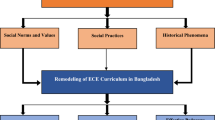Abstract
This study investigates the three major educational philosophies behind the medical humanities programs in the United States. It summarizes the characteristics of the Cultural Transmission Approach, the Affective Developmental Approach, and the Cognitive Developmental Approach. A questionnaire was sent to 415 teachers of medical humanities asking for their perceptions of the amount of time and effort devoted by their programs to these three philosophical approaches. The 234 responses constituted a 54.6% return. The approximately 80:20 gender ratio of males to females and other demographic data on age and educational background were consistent with other studies of the field of medical humanities.
Reflections on the results in Table II indicate that some changes need to take place in the teaching of the medical humanities if the perceived ideal is to be achieved. In order for the current teachers of the medical humanities to think that the appropriate philosophies behind the teaching of the medical humanities are being implemented as they should be, much less time and effort need to be devoted to the Cultural Transmission Approach. With no other published reports on the educational philosophies behind the medical humanities programs, this study created a new knowledge base about this relatively young and rapidly emerging field.
Similar content being viewed by others
References
Pellegrino ED, McElhinney TK.Teaching Ethics, the Humanities, and Human Values in Medical Schools: A Ten-year Review. Washington, D.C.: Society for Health and Human Values, 1982: 1–101.
Bickel J.Integrating Human Values Teaching Programs Into Medical Students' Clinical Education. Washington, D.C.: Association of American Medical Colleges, 1986: 1–37.
Self DJ, Wolinsky FD, Baldwin DC Jr. The effect of teaching medical ethics on medical students' moral reasoning.Academic Medicine 1989; 64 (12):755–759.
Self DJ, Baldwin DC Jr, Wolinsky FD. Evaluation of teaching medical ethics by an assessment of moral reasoning.Med Educ 1992; 26:178–184.
Self DJ. The pedagogy of two different approaches to humanistic medical education: cognitive vs affective.Theor Med 1988; 9:227–236.
Kohlberg K, Mayer R. Development as the aim of education: the Dewey view.Harvard Educational Review 1972; 42:449–496.
Self DJ, Skeel JD. Professional liability (malpractice) coverage of humanist scholars functioning as clinical medical ethicists.The Journal of Medical Humanities and Bioethics 1988; 9:101–110.
Self DJ, Skeel JD, Jecker NS. The moral development of clinical medical ethicists: the influence of philosophical vs. theological education.Academic Medicine 1993; 68: (in press).
Skeel JD, Self DJ, Skeel RT. A description of humanist scholars functioning as ethicists in the clinical setting.Cambridge Quarterly of Health Care Ethics 1993; 2: (in press).
Kohlberg K, Mayer R. Development as the aim of education: the Dewey view.Harvard Educational Review 1972; 42:449–496.
Author information
Authors and Affiliations
Rights and permissions
About this article
Cite this article
Self, D.J. The educational philosophies behind the medical humanities programs in the United States: An empirical assessment of three different approaches to humanistic medical education. Theor Med Bioeth 14, 221–229 (1993). https://doi.org/10.1007/BF00995164
Issue Date:
DOI: https://doi.org/10.1007/BF00995164




